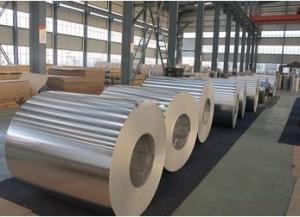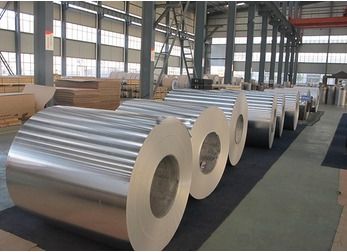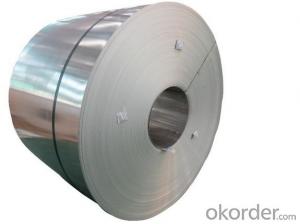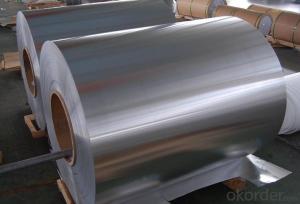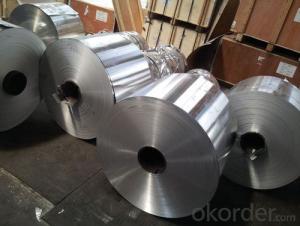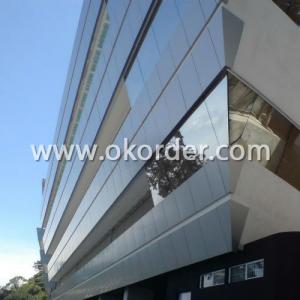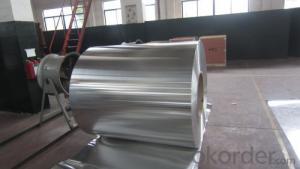Aluminum Coil 1050 1200 3004 H14 H24 5052 for Composite Panel on Sale
- Loading Port:
- Shanghai
- Payment Terms:
- TT OR LC
- Min Order Qty:
- 1 m.t.
- Supply Capability:
- 6000 m.t./month
OKorder Service Pledge
OKorder Financial Service
You Might Also Like
Specification
Product Description:
1) alloy number: 1050 1060 1100 1200 3003 3004 3105 3A21.
2) temper available: O H12 H14 H16 H18 H22 H24 .
3) application: mechanical components,bottle caps,construction materials, Roofing materials; Car license plate, Road signs;cookware bottom plates, Fry pans,Tea kettles,Pressure cookers
4) thickness: 0.2-10mm.(+/-0.02mm)
5) diameter: 20-2500mm.(+/-0.5mm)
6) production treatment: cold rolled or hot rolled.
7) surface appearance: flat clean surface no whole, scratch, oil dirty and oxidation.
8) cutting edge: neat cutting edge no burrs.
Chemistry Composition & Mechanical Properties
Alloy | Si | Fe | Cu | Mn | Mg | Cr | Ni | Zn | Ti | Al |
1060 | 0.25 | 0.4 | 0.05 | 0.05 | 0.05 | 0.05 | 0.03 | 99.6 | ||
1050 | 0.25 | 0.4 | 0.05 | 0.05 | 0.05 | 0.05 | 0.03 | 99.5 | ||
1100 | 0.95 | 0.05-0.2 | 0.05 | 0.1 | 99.0 | |||||
1200 | 1.0 | 0.05 | 0.05 | 0.1 | 0.05 | 99.0 | ||||
3003 | 0.6 | 0.7 | 0.05-0.2 | 1.0-1.5 | 0.1 | remainder | ||||
Surface
Be free from Oil Stain, Dent, Inclusion, Scratches, Stain, Oxide Discoloration, Breaks, Corrosion, Roll Marks, Dirt Streaks and other defect which will interfere with use
Surface without black line, clean cut, periodic stain, roller printing defects, such as other gko internal Control standards.
You can't see any tiny space between the plates when they are piled up. And the surface is smoothly without freckles.
We have strict and professional procedures of production:
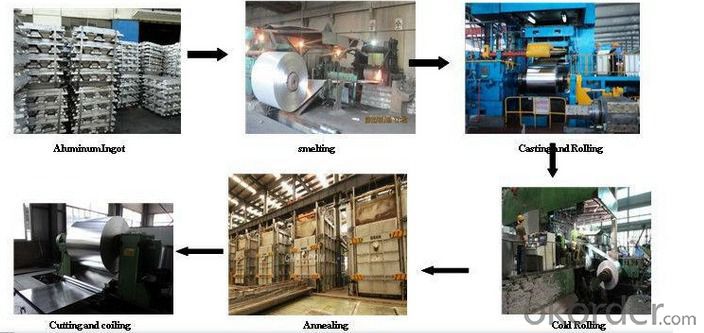
Certification
Product quality and ISO certification are the major factors that have raised our credibility in the industry. Keeping this in mind, We practice advanced manufacturing techniques and scrutinize each product on various quality parameters. To ensure international standards of quality in our range, we manufacture these products using quality tested metals and alloys.
FAQ of Aluminium Coil for ACP (Aluminum Composite Panel):
1.Superior quality of raw material.
2.Reasonable and stable chemical composition.
3.Accurate tolerance.
4.Goode mechanical property.
5.We have the certificate of ISO9001.
- Q: Are there any limitations on the surface treatment of aluminum coils?
- The surface treatment of aluminum coils has certain limitations. One limitation pertains to the type of surface treatment suitable for aluminum coils. Anodizing, painting, and powder coating are some options for surface finishes. However, not all treatments are suitable for every application. For instance, anodizing is a durable and corrosion-resistant finish but may not meet the requirements of applications that demand specific colors or designs. Similarly, painting and powder coating offer a wide range of colors and aesthetics but may not match the durability of anodizing. Another limitation concerns the size and shape of the aluminum coils. Surface treatment processes have size and shape restrictions for aluminum coils. For example, anodizing is typically performed in tanks or racks, which may have size limitations. Similarly, painting and powder coating processes may require specific equipment or facilities that cannot accommodate large or irregularly shaped coils. Furthermore, the condition of the aluminum surface affects the effectiveness of the surface treatment. Imperfections or surface defects on aluminum coils can impact the adhesion and durability of the treatment. Proper cleaning and preparation of the aluminum surface are crucial to ensure the effectiveness of the surface treatment. In conclusion, while there are various surface treatments available for aluminum coils, limitations exist regarding the type of treatment, the size and shape of the coils, and the condition of the aluminum surface. It is important to consider these limitations and select the most suitable surface treatment based on the specific requirements and constraints of the application.
- Q: What are the thermal conductivity properties of aluminum coils?
- Aluminum coils have excellent thermal conductivity properties. Aluminum is known for its high thermal conductivity, meaning it can effectively transfer heat. This makes aluminum coils ideal for applications that require efficient heat transfer, such as in air conditioning and refrigeration systems. The thermal conductivity of aluminum coils allows for quick and effective cooling or heating, resulting in energy efficiency and enhanced performance. Additionally, aluminum's good thermal conductivity ensures that heat is evenly distributed across the coil, preventing hotspots and ensuring uniform temperature distribution. Overall, the thermal conductivity properties of aluminum coils make them a preferred choice for various heat transfer applications.
- Q: Are aluminum coils compatible with different welding methods?
- Different welding methods can be used with aluminum coils. Aluminum is a versatile metal that can be welded using techniques like gas tungsten arc welding (GTAW) and gas metal arc welding (GMAW). These methods are commonly used for welding aluminum coils because they produce high-quality welds. GTAW, also known as TIG welding, is particularly suitable for aluminum. It allows for precise control of heat input and produces excellent weld quality. TIG welding uses a non-consumable tungsten electrode and an inert gas like argon to protect the weld zone from contamination. GMAW, also known as MIG welding, is a faster process that uses a consumable wire electrode and a shielding gas to protect the weld pool. It is widely used in industrial applications due to its efficiency and ease of use. In addition to TIG and MIG welding, other methods like laser welding and friction stir welding can also be used for aluminum coils, depending on specific requirements. Proper preparation is crucial for successful welds. Cleaning and surface treatment of the aluminum coils are important to remove contaminants or oxide layers that could affect the welding process. Overall, different welding methods can be used with aluminum coils, and the choice depends on factors like desired weld quality, production requirements, and available skills and equipment.
- Q: What are the potential drawbacks or limitations of using aluminum coils?
- Using aluminum coils has several potential drawbacks and limitations. Firstly, aluminum is a softer metal compared to materials like copper or steel, making the coils more susceptible to damage such as denting or bending, especially in high-impact environments. Additionally, aluminum is prone to corrosion, especially in harsh or corrosive surroundings, which can negatively affect the coils' performance and lifespan. Another limitation of aluminum coils is their lower thermal conductivity in comparison to copper coils. This means that aluminum coils may not transfer heat as efficiently, resulting in decreased cooling or heating performance in certain applications. Moreover, the lower thermal conductivity may lead to higher energy consumption as the system needs to work harder to achieve the desired temperature. Furthermore, when aluminum coils are used in HVAC systems, compatibility issues can arise with specific refrigerants. Aluminum can react with certain refrigerants, causing corrosion or other chemical reactions that could compromise the coils' performance and longevity. Therefore, careful consideration and compatibility testing are necessary when selecting a refrigerant to use with aluminum coils. Lastly, the cost of aluminum coils can be higher compared to other coil materials. Although aluminum itself is relatively inexpensive, the manufacturing process for aluminum coils can be more complex and costly, impacting the overall product cost. Despite these drawbacks, aluminum coils are still widely utilized in various industries due to their lightweight nature, good electrical conductivity, and resistance to certain types of corrosion. However, it is crucial to thoroughly evaluate the specific application, environment, and requirements before choosing aluminum coils to ensure they are the most suitable option.
- Q: Are aluminum coils suitable for electrical conductors?
- Aluminum coils, indeed, prove to be suitable for electrical conductors. Due to its remarkable electrical conductivity, aluminum has become a widely utilized material in the electrical industry. It possesses approximately 61% conductivity in comparison to copper, the utmost commonly employed metal for electrical conductors. Lightweight, cost-effective, and possessing good thermal conductivity, aluminum coils have become a favored selection for a range of electrical applications. Nonetheless, it is noteworthy that aluminum has a lower tensile strength than copper, thus potentially demanding a larger cross-sectional area to attain an equivalent level of current carrying capacity. Furthermore, to prevent oxidation and guarantee efficient electrical conductivity in aluminum coils, it is imperative to employ proper insulation and connectors.
- Q: Is it safe or advisable to use aluminum coil for wrapping food?
- <p>Using aluminum coil to wrap food is not recommended. Aluminum can react with acidic or alkaline foods, potentially leaching harmful aluminum particles into the food. It's also not designed for food contact and may not be safe at high temperatures. Instead, use food-grade aluminum foil, which is specifically designed for cooking and wrapping food, ensuring it doesn't come into contact with non-food surfaces that could contaminate it.</p>
- Q: We are shopping for a new LQ trailer. We are looking at several different brands and noticed that some have aluminum skin on an aluminum frame, and others have aluminum skin on a steel frame. Other than the obvious differences in weight and cost, what are other benefits/disadvantages of each? Thanks
- Steel is heavier, which makes the frame sturdier, but having gone from a 1973 Shoop two horse steel bumper pull to a 2008 Wrangler Aspen aluminum three horse slant w/ tack room, the new trailer, at 16', is so much lighter than the old, even with three horses in it. There is a definite savings in gasoline! Our truck never changed. We are still pulling with our 1999 Dodge Ram Lariat 1500 4x4. But we did have a brake box installed in truck! The trailer was manufactured with a brake/fuse box electric brakes.
- Q: Can aluminum coils be used for heat sinks?
- Yes, aluminum coils can be used for heat sinks.
- Q: Describe the different methods used to produce aluminum coils.
- <p>Aluminum coil is produced through several methods, primarily involving the process of rolling. The main methods include: 1) Hot rolling, where aluminum slabs are heated and rolled into coils at high temperatures. 2) Cold rolling, which involves rolling aluminum at room temperature to achieve thinner gauges with higher precision. 3) Continuous casting and rolling, a process where aluminum is cast and rolled in one continuous operation, optimizing production efficiency. 4) Twin-roll casting, a method where molten aluminum is cast directly between two counter-rotating rolls, forming a thin strip that can be coiled immediately. Each method has its advantages and is chosen based on the desired coil properties, thickness, and application.</p>
- Q: Are aluminum coils suitable for architectural sunshades?
- Indeed, architectural sunshades can be made using aluminum coils. The lightweight quality, durability, and resistance to corrosion make aluminum a favored material for sunshades. With aluminum coils, a wide range of shapes and designs can be achieved, providing flexibility in architectural design. Moreover, aluminum is easy to fabricate and install, making it a convenient choice for architectural projects. Additionally, aluminum possesses exceptional thermal properties that enable effective heat reflection and reduction of solar gain, thereby enhancing energy efficiency in buildings. All in all, aluminum coils emerge as a suitable and adaptable choice for architectural sunshades.
Send your message to us
Aluminum Coil 1050 1200 3004 H14 H24 5052 for Composite Panel on Sale
- Loading Port:
- Shanghai
- Payment Terms:
- TT OR LC
- Min Order Qty:
- 1 m.t.
- Supply Capability:
- 6000 m.t./month
OKorder Service Pledge
OKorder Financial Service
Similar products
Hot products
Hot Searches
Related keywords
